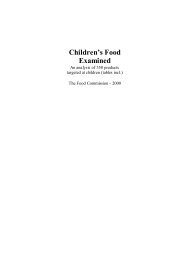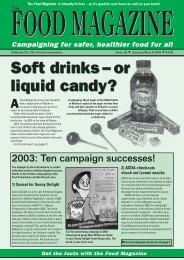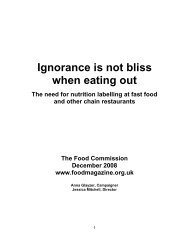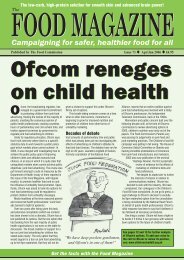Children's Nutrition Action Plan - The Food Commission
Children's Nutrition Action Plan - The Food Commission
Children's Nutrition Action Plan - The Food Commission
You also want an ePaper? Increase the reach of your titles
YUMPU automatically turns print PDFs into web optimized ePapers that Google loves.
Charlie Powell<br />
Sustain: <strong>The</strong> alliance for better food and farming<br />
While children’s diets are contributing towards the development of numerous diseases and<br />
health disorders, manufacturers and advertisers spend hundreds of millions of pounds<br />
promoting fatty, sugary and salty foods directly to children.<br />
Those wishing to safeguard children’s health advocate regulatory controls on the promotion<br />
of food to children. But should this take the form of a voluntary code of practice, as proposed<br />
by the <strong>Food</strong> Standards Agency, or would statutory provisions be more effective?<br />
When might voluntary codes of practice be effective?<br />
<strong>The</strong> recently launched Joint Health Claims Initiative is a tripartite collaboration between<br />
consumers, food producers and enforcement authorities who have worked together to develop<br />
a voluntary code of practice on health claims for foods.<br />
<strong>The</strong>re is common ground between the parties. Manufacturers that invest heavily in product<br />
development of functional foods want to see that investment protected by exclusion of<br />
companies that market products with poorly researched or unfounded claims. Consumers also<br />
want to be sure that health claims are substantiated, reliable and informative.<br />
In the case of the Joint Health Claims Initiative, consensus, albeit for different reasons, is<br />
possible. However the fact that these codes of practices are voluntary means that there are a<br />
number of reasons why they might not be effective.<br />
Are voluntary codes of practice pro-active?<br />
In 1998, SmithKline Beecham launched Ribena Toothkind and made an explicit and absolute<br />
claim that the product did not encourage tooth decay. However, acting on independently<br />
commissioned scientific tests, the Advertising Standards Authority upheld a complaint that<br />
this claim was misleading.<br />
<strong>The</strong> Advertising Standards Authority’s adjudication lasted two years during which<br />
SmithKline Beecham had launched three national, multimedia campaigns, all based on a<br />
claim that was subsequently shown to be misleading. By the time the judgement was issued,<br />
millions of customers had already seen the advertising carrying the claim and purchased the<br />
product.<br />
This method of regulation has been criticised because it is not pro-active, and it tackles<br />
misleading or potentially misleading advertising after it has already gone into circulation.<br />
What happens when a manufacturer or advertiser ignores a code of practice?<br />
<strong>The</strong> British code of advertising and sales promotion does not apply to claims made on<br />
packaging, as the case of Ribena Toothkind clearly illustrates. Following the Advertising<br />
Standards Authority ruling, the claim still appears on the packaging: ‘Ribena Toothkind does<br />
not encourage tooth decay’ – the very claim criticised by independent scientific and judicial<br />
assessment as misleading.<br />
<strong>The</strong> Children’s <strong>Nutrition</strong> <strong>Action</strong> <strong>Plan</strong>, published by <strong>The</strong> <strong>Food</strong> <strong>Commission</strong><br />
35














